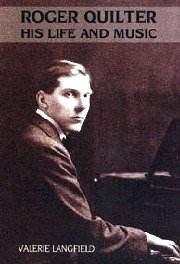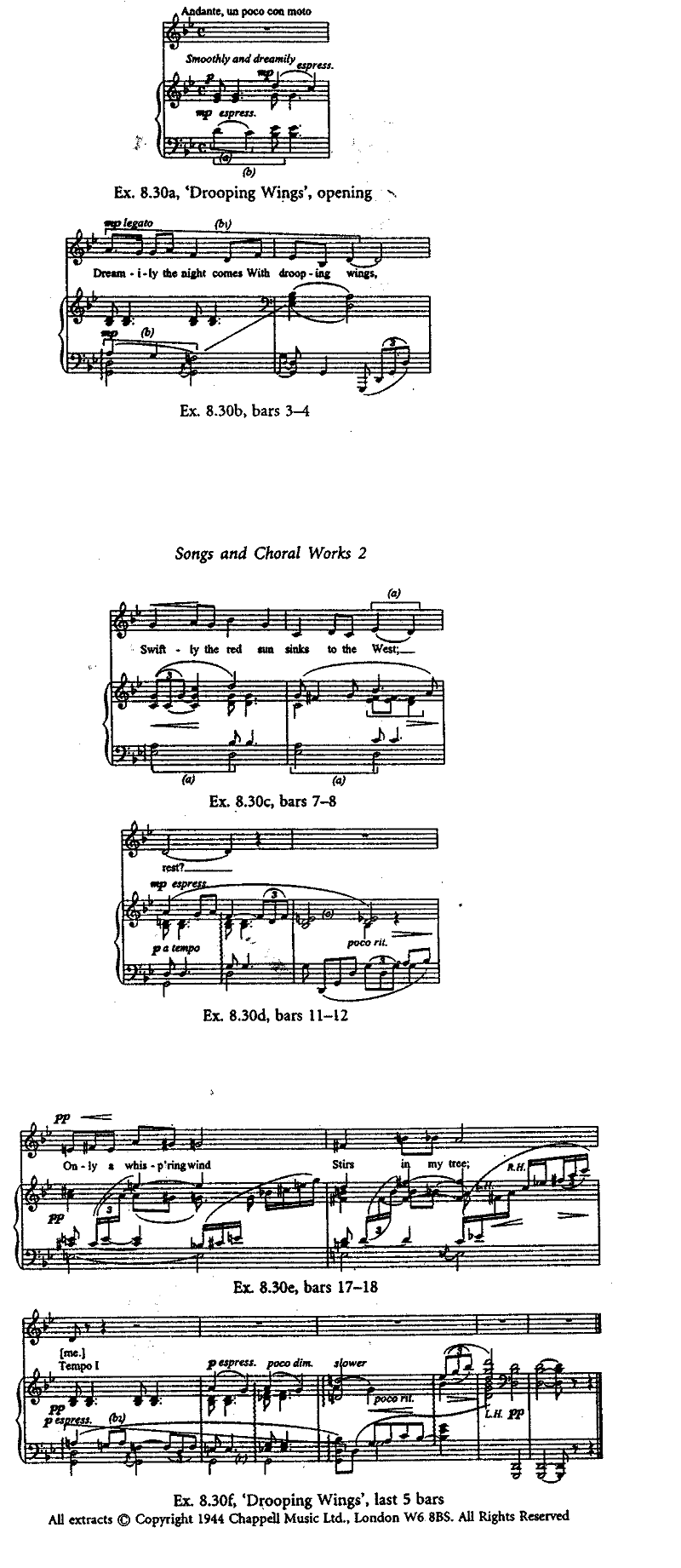ROGER QUILTER: His Life and Music by Valerie Langfield, Boydell Press, 2002: xviii, 375pp, plus CD ISBN 0-85115-871-4 £40 hardback / US$70

'It may be that the final opinion will be, a talent exquisite but limited.
His friends will however reply: if limited, then limited as is a Shakespeare
lyric or an epigram of Simonides. Some of Quilter's songs will live as
long as the language, for they are perfect English settings of perfect
English words. They may even be sung when most of the symphonies and tone
poems of the last fifty years are lost.'
Sir Quintin Hill: Obituary in 'Music & Letters' 35/1 Jan 1954
______________________
Can I for a brief moment be permitted to indulge in nostalgia. I am, in imagination, a lad of fourteen or fifteen, tortured by the pangs of adolescence. On the piano rest is the music of ‘Fill a Glass with Golden Wine’ - on the turntable the voice of Gervase Elwes. How exquisite that torture - how fragrant last year’s rose!
It will come as something of a surprise to many - it certainly did to me - to find a book on Roger Quilter occupying around 375 pages: almost an inch and a half thick: devoted to this small and "limited talent".
Valerie Langfield, in this beautifully produced book, demonstrates clearly both the exquisite nature, and the limitations of that talent. The ‘exquisite’ is set in the scene of yesteryear and today’s limitations, within that ‘walled-in garden’ that Quilter chose to cultivate, are demonstrated without detracting one whit from the richness of those songs which, although perhaps in domestic circles rather than on the concert platform, have retained their popularity.
My moment of nostalgia (sharpened by the ubiquitous flattened seventh in the closing bars of ‘Fill a Glass with Golden Wine’ and elsewhere) passed quickly enough - for page after page is fussed with footnotes (mostly references to correspondence with friends such as the Graingers and de Glehns) And the text, eminently readable in the biographical pages nevertheless becomes somewhat dense with analytical description, having to do mostly with movement and exchanges of tonal centres:
In the accompaniment the opening appoggiatura from d1 resolving onto c1 (a) with a resultant dissonance, reinforced by repetition of the right hand chord, sets the tone: the fall to the b flat below completes a three note motif (b) that pervades the song (ex 8.30a opening) It is immediately imitated. by the voice's opening notes, doubled by the piano In the tenor range the voice continues the downward scale to d1 (ex 8.30 bars 3-4 (b1)): the motif is echoed in the next line, a third higher with a temporary move to the relative major: pairs of notes in the bass line sigh as they fall from e flat 1 to d1 on 'drooping wings' (ex 8.30 c bars 7-8): the first verse comes to an end, seemingly complete? but the piano now harks back to the voice recalling its opening notes, and emphasising the fall to d1 by adding a chromatic e natural 1 (ex 8.30 d bars 11-12 (c).) pages 208/9
As this refers to a late, and evidently more significant song, ‘Drooping Wings’ (Edith Sterling-Levis), less well known, such description conveys not a great deal to the reader/listener, though admirable in a thesis. The song, which she singles out as ‘in an altogether different league’ was published by Chappell in 1945 - and I have not yet ascertained whether copies are still available? However, with other better known songs even this kind of analysis spurs the memory to run through in one’s mind the familiar lines of melody and characteristic harmonies. Yet, how DOES one ‘describe’ such fragile expression?
However the publishers have been wonderfully generous with music examples - some 175 to be precise (tho’ numbered à la Professor Banfield’s Finzi - in related groups.) The fourteen bars quoted from this particular song are enough to whet the appetite - and the author continues her description, with poetic insight.
An abrupt shift to D major draws the curtain aside, allowing a moonbeam brief entrance, a ray of hope. An exquisite A major chord. second inversion, prolongs the possibility , the 'whispering wind stirs' and the vocal line rises in sequence, but it is held back by the pedal e in the bass (ex 8.30 e bars 17-18): at the very point of escape, escape is withdrawn, the dream dies and we are drawn back to the opening. The voice has been silenced and its music (b2) can only be heard on the piano over a bass G, sustained until it falls a further octave to the end. (ex 8.30f last 5 bars.)
My appetite is whetted, and I now search for a copy of this song.

The book is well researched, but most of all it is written with a fine sensitivity, especially in dealing with the ‘life’. Quilter’s dislike of the sports-orientated physical regime of Eton (in the shadow of his elder brother Arnie) in contrast to his prep school where his musical and poetic leanings were encouraged - his close relationship with his mother - his father’s cool reaction to his son’s talents the boy’s delicate constitution - and above all his homosexuality and final descent into losing hold on reality - all are treated with understanding and with no hint of dramatisation.
There are 110 pages devoted to the man - 168 pages of analysis, dealing mostly with the songs, yet adequately covering the small piano and instrumental works, and the theatre music (including a complete synopsis of Clifford Mills’ tale, ‘Where the Rainbow Ends’) A final 100 or so pages are devoted to the customary index of works, discography and bibliography - but more significantly a lexicon of personalities, which reinforces in a way the scene and background from which Quilter emerged, and against which his art is judged. For it does seem as if Quilter (through whose veins flowed too much rich upper middle class blood to be an artist - his own words,) was happiest, or at least most at home in circles of his friends of artistic and aristocratic taste, not always specifically musical with his nearest musical companions (in spirit at least) Percy Grainger, Cyril Scott, Norman O’Neill and Balfour Gardiner, with whom he had been fellow student at Frankfurt.(**)
The main thrust therefore of Valerie Langfield’s assessment is that element in Quilter which bonded him to certain poets - Shakespeare, Herrick, the Jacobeans, Henley and certain very minor voices - and who provided the inspiration for what have undoubtedly been, and remained, his most loved and successful songs - ‘Fair House of Joy’, and ‘Go Lovely Rose’. (*)
"It all began" she writes, "with ‘Now Sleeps the Crimson Petal’... It was not for them [Quilter and the Frankfurt ‘Gang’] to set the War poets: their roots lay further back into the heart of the Nineteenth century ..."
That is an important and convincing assessment which robs Quilter of nothing of his beauty of expression - and if any confirmation were needed, within the back cover of the book is secreted a CD containing thirty-seven tracks - 17 of songs sung by Mark Raphael with Quilter at the piano: 8 tracks of Hubert Eisdell’s Columbia recording (1923) of ‘To Julia’ with String 4tet: 6 more recent tracks with Frederick Harvey again with the composer: and a final half-dozen orchestral excerpts from ‘Where the Rainbow Ends’. These delightful early recordings have a rusty fragrance that is perfectly in keeping with the thesis - note how Quilter, in ‘Go Lovely Rose’ affectionately spreads these luscious chords!
The book is expensive - but is a ‘must’ for all lovers of English song.
© Colin Scott-Sutherland
(*) For a list of what are the most popular of Quilter’s songs, see Michael Pilkington (Indiana University Press 1989) ‘Gurney, Ireland, Quilter and Warlock’ pp. 77-110
(**) Professor Banfield once dismissed the ‘Frankfurt Gang’ as ‘a damp squib in the history of English music’ perhaps a little unfairly? Significantly, of Quilter’s music he writes ‘all these artless artefacts [Quilter’s mannerisms. or ‘fingerprints’ produce a semi-precious stone of polished perfection as to whose real value it is best not to enquire too closely] Many might agree, yet be content with the finished ‘polished perfection’. I am tempted to wonder how one day someone will view the ‘artless artefacts’, the disjointed grinds and bumps that inhabit so many late 20th century scores?
See also review by Philip Scowfield and John Talbot
This review appears courtesy of the British Music Society
British Music Society - Promoters of the British Musical Heritage
Membership enquiries to:
Hon. Treasurer: Stephen Trowell
7 Tudor Gardens
Upminster
Essex RM14 3DE
( 01708 224795
Annual subscription £18.00 (UK residents only)
Patron £25.00 (minimum) (UK residents only)
All membership applications welcome. Enquiries from those outside the UK are particularly invited. An approach should be made to Stephen Trowell.